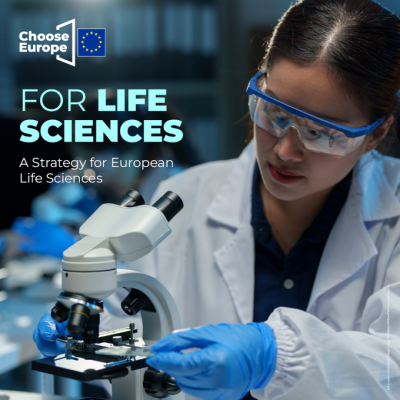
As the European Commission sets a clear course to establish the EU as a global leader in life sciences by 2030, the CBE JU is proud to play a central role in driving the transformation. The European Life Sciences Strategy announced today places strong emphasis on the bioeconomy and bio-based innovation, areas where CBE JU and its partners are already delivering impact.
Main objectives of the strategy are:
Position the EU as the world's most attractive place for life sciences by 2030.
Strengthen the EU's global leadership in biotechnology, biomanufacturing, and the bio-based sectors.
Support economic growth, sustainability, and strategic autonomy through life sciences innovation.
Enhance the sustainability, health, and competitiveness through innovation.
Bio-based innovation at the heart of sustainable growth
The strategy recognises that bio-based innovation is key to tackling the EU’s greatest environmental challenges: climate change, biodiversity loss, and pollution. It calls for accelerating the development and uptake of circular, resource-efficient, and low-emission technologies, with biotechnology, synthetic biology, and bioengineering identified as critical enablers.
Importantly, The upcoming EU Bioeconomy strategy (2025) is expected to accelerate the deployment of circular, sustainable bio-based solutions, reinforcing the role of programmes like CBE JU in delivering systemic transformation across value chains. For CBE JU, this reaffirms the strategic relevance of our mission to scale up bio-based solutions that reduce dependency on fossil resources and enable sustainable growth.
Discover the work on the Bioeconomy strategy
Learn more about CBE JU’s strategic role in green economic growth
Circular Biocarbon: A flagship for circularity and impact
A standout example cited in the strategy is the CBE JU-funded Circular Biocarbon project. This innovative initiative is working with municipalities to convert urban biowaste into high-value bio-based products, including biopolymers for agriculture and advanced materials for a wide range of applications like biofertilisers, green night vision cameras and green photonic devices for 5G telecom technology. The project’s first-of-its-kind flagship biorefinery was inaugurated in Zaragoza, Spain in October 2024, and a similar plant is currently under construction in Sesto San Giovanni, Italy. Once the waste treatment complex is fully operational, the Circular Biocarbon biorefinery will treat waste generated by around a million people a year.
With the replication potential in over 20,000 European waste recovery facilities, and targeting a global market projected at over €100 billion in 2024, the project illustrates how life sciences and the bioeconomy can directly support Europe’s green transition while creating scalable economic opportunities.
Projects funded by CBE JU like Circular Biocarbon are increasingly seen as scalable, replicable models for Europe’s circular industrial future, with implications for sectors ranging from waste valorisation to precision fermentation and advanced biomanufacturing.
Discover the Circular Biocarbon project
Take a look at CBE JU-supported projects in your country, and in Europe
Strategic investment for bio-based excellence
To support the EU’s life sciences ambitions, the Commission plans to mobilise €200 million through the research & innovation programme Horizon Europe for the 2026-2027 period, with dedicated contributions to CBE JU. This investment will drive research in:
Cross-sectoral life sciences technologies,
Novel molecules and advanced materials,
Efficient biomanufacturing processes, and
Bioremediation and carbon circularity.
The funding will build on CBE JU’s ongoing work in de-risking bio-based innovation, scaling demonstration projects, and facilitating market deployment of circular bioeconomy solutions.
Discover CBE JU’s 2024 achievements in advancing circular bio-based innovations in Europe
Reinforcing Europe's bioeconomy leadership
The life sciences strategy reinforces Europe’s vision of a competitive, sustainable, and resilient bio-based economy. By integrating life sciences innovation with industrial decarbonisation goals and circular economy principles, the EU is charting a cohesive roadmap where CBE JU’s work is integral.
From upscaling innovation and attracting investment to fostering partnerships across public and private sectors, the CBE JU is committed to delivering on this vision. With strong alignment between the Commission’s strategic objectives and our portfolio of projects, we are well-positioned to shape a cleaner, smarter, and more sustainable Europe through the power of bio-based innovation.
